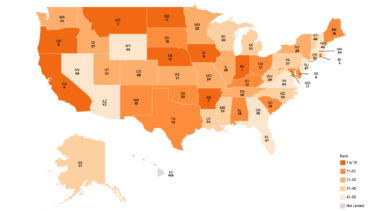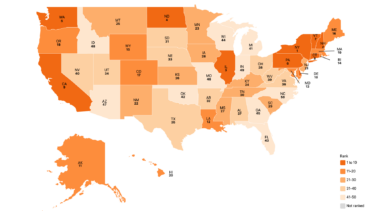-
Georgia’s teacher pension system needs reforms to address current debt, future risks
The pension plan is still $27.7 billion short on the assets needed to pay for retirement promises made to teachers.
-
Transparent K-12 open enrollment data matters to parents, policymakers and taxpayers
A total of 16 states have strong statewide cross-district open enrollment laws, while 13 states have strong statewide within-district open enrollment laws.
-
The cost of state hold harmless policies in K-12 education
With widespread public school enrollment losses in the wake of the COVID-19 pandemic, the financial costs of some hold harmless policies have increased exponentially.
-
Reforming environmental litigation
There is growing bipartisan support that the NEPA process, as it has evolved since the legislation’s enactment in 1970, has gone too far, placing obstacles and delays in the way of needed energy and transportation infrastructure projects.
-
State taxpayers’ share of MPSERS debt would increase under various proposals
The first 20.96% of each year’s unfunded accrued liability contribution is currently paid by local school districts, and any amount required above that is paid by the state.
-
Michigan requires greater transparency to support public trust in law enforcement
Michigan House Bill 5749 would clarify that law enforcement disciplinary records are not exempted from public records requests.
-
Is private equity a public financial hazard?
Private equity funds lack clear return and risk metrics, making it hard to assess performance before investments are redeemed, often a decade or more after the initial investment.
-
Delaying Mississippi PERS reform will increase cost to taxpayers
PERS faces a $25.5 billion shortfall largely due to unfunded benefit increases, investment underperformance, and insufficient employer contributions.
-
Getting cannabis legalization right in Hawaii
Hawaii may be poised to become the 25th state to legalize the recreational use of cannabis for adults aged 21 and over.
-
How to modernize and properly fund the inland waterway system
There's an $800 million backlog of current inland waterway system projects and another $6 billion worth of projects planned, but not yet started.
-
Ibogaine treatment for opioid use disorder
Policymakers should consider ibogaine as a potential alternative treatment for opioid use disorder.
-
Regulated psilocybin access in Arizona would help treat mental health conditions
Arizona Senate Bill 1570 would create a regulated and limited program to access psilocybin.
-
The effects of cash bail on crime and court appearances
Research suggests that curtailing the use of monetary release conditions among low-risk defendants would not result in dramatic drops in court attendance or increased risk of reoffending.
-
Senate Bill 88 would expose Alaska to significant additional costs
This bill could realistically add $9.6 billion in additional costs to future state budgets and reintroduce Alaska to significant pension risk.
-
Public education at a crossroads: A comprehensive look at K-12 resources and outcomes
Examining key education spending, enrollment, staffing, and student performance data over the past two decades in all 50 states.
-
Public education at a crossroads: K-12 education revenue and expenditure trends 2002-2020
Nationwide, inflation-adjusted public school revenues grew from $12,852 per student in 2002 to $16,065 per student in 2020.
-
Public education at a crossroads: Enrollment, staffing, and teacher salary trends 2002-2020
Nationwide, inflation-adjusted average teacher salaries fell by 0.6% between 2002 and 2020 with a total of 26 states seeing declines.
-
Public education at a crossroads: Math and reading outcomes (low-income students only)
Between 2003 and 2019, the average U.S. 4th grade NAEP math score for free and reduced-price lunch eligible students increased by seven points.

















